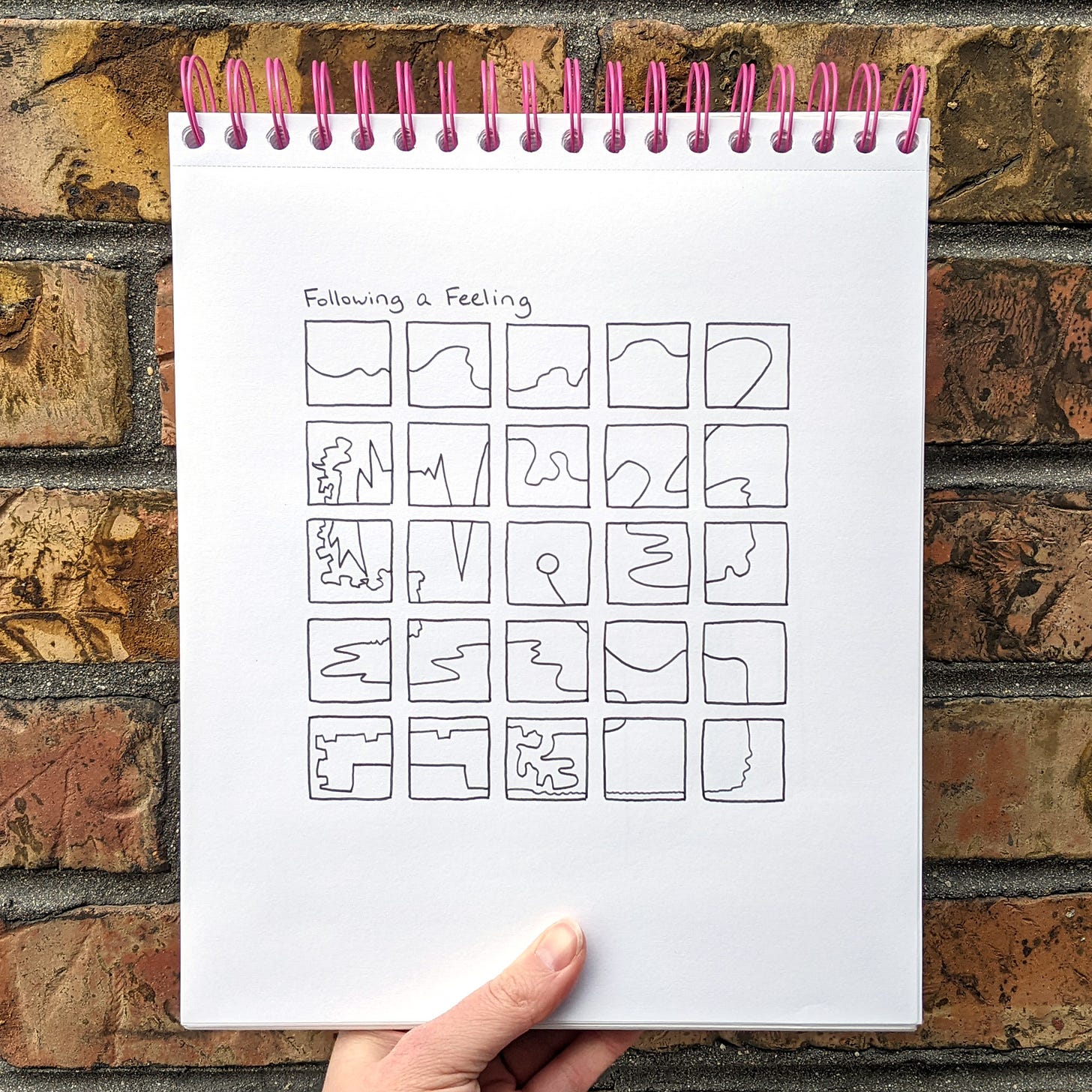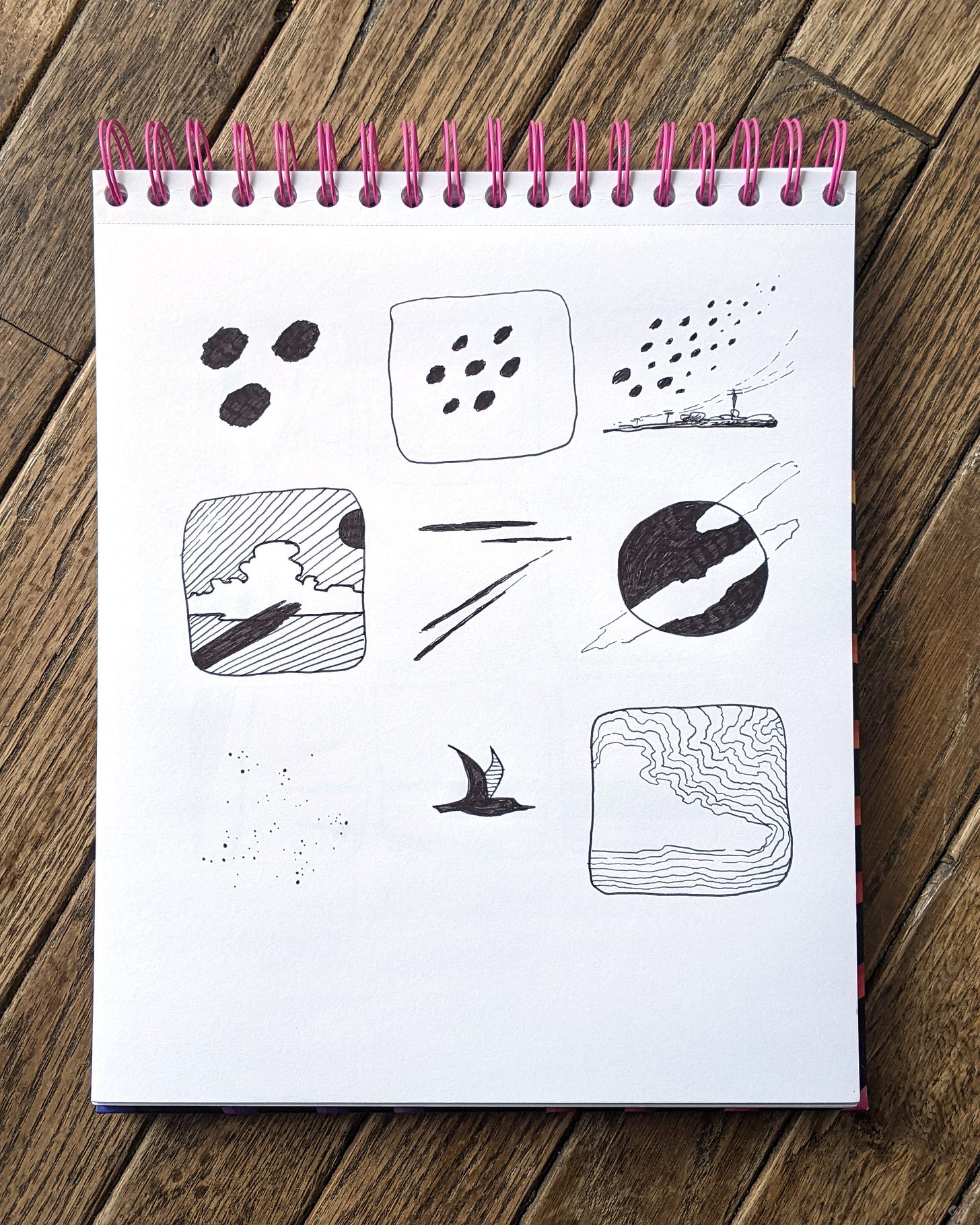It seems to me that all creative work is following a feeling. Maybe that is obvious, but sometimes I think the essence of creative work gets muddied by outside forces. If you strip away all the noise around process, materials, new technology, various industry BS, etc., making creative work boils down to one thing: trying to capture a feeling and share it with others.
Feelings and thoughts are elusive, and I think that’s exactly what drives me to try to capture them on the page.
I’m a copywriter by day, primarily working on long-form articles about technology for a business audience. This may sound miles away from “following a feeling” (I mean, it is…), but I’d argue every piece of writing is trying to capture a feeling — even if that’s as simple as instilling confidence in the ideas presented throughout an article or trying to evoke intrigue in an email subject line. Humans are big ol’ bags of feelings, after all, and the only way we pay attention to anything is if it makes us feel something.
Like many writers, I’ve started experimenting with generative AI tools like ChatGPT and Microsoft Copilot in an attempt to work faster. I’ve found it’s occasionally good for summarizing content or generating initial ideas, but it’s still pretty awful at generating continuous paragraphs worth reading. It tends to be repetitive and cliché, reliably spitting out headlines like, “Unlock the power of XXX” and articles that start with, “In today’s fast-paced industry of blah, blah, blah…”
Don’t get me wrong, I think the possibilities of AI are fascinating, and I’m going to continue experimenting. Sometimes I secretly wish AI would just write my articles for me! Luckily, it can’t yet. (Phew!) And it makes me feel fortunate to have a job that requires more in-depth thinking than spitting out surface-level syntax.
I recently started reading “More Than Words: How to Think about Writing in the Age of AI” by John Warner. The introduction has already captured my attention with this key concept:
“Writing is thinking. Writing involves both the expression and exploration of an idea, meaning that even as we’re trying to capture the idea on the page, the idea may change based on our attempts to capture it. Removing thinking from writing renders the act not writing.
Writing is also feeling, a way for us to be invested and involved not only in our own lives but the lives of others and the world around us.”
YES. I love this description of writing as an act, not just an output. We even have different words for the act of putting words on the page (or screen): Writing vs. Transcribing vs. Notetaking vs. Translating… I’m sure there are more! Currently, what AI does is not writing, it is generating.
I’m reading this book, not because I’m afraid of AI (at least… not yet), but because I want to build a better framework for how to think about AI in the greater scheme of writing and creating in general. I’m excited to continue reading. So far it’s been an excellent reminder of what it means to be human.
In other news, I will be tabling at Milwaukee Zine Fest again this year! This is my favorite zine fest, and I feel really fortunate that it’s right in my backyard. If you’re in the Milwaukee area, here are the details:
Milwaukee Zine Fest
Saturday, April 19 — 10:30 am to 4:30 pm
Milwaukee Central Library
814 W Wisconsin Ave.
Milwaukee, WI 53233
I’m working on getting my inventory together, and I hope to have a new color version of Stink Bugs hot off the press! I’m thinking about making a series of small fun-fact zines about creatures that intrigue me. The black and white version of Stink Bugs has been surprisingly popular over the years (the topic tends to evoke strong reactions!), so I thought it would be a good starting point. Here is the new full-color cover!
Thanks for reading! Until next month, stay safe out there and savor your humanity.
xoxo,
Sheri
P.S. In case you missed it, last month I wrote about Garbage In, Garbage Out. If you enjoy my work and want to follow along, subscribe to receive a free monthly dispatch on what I’m making and thinking about.







I am going to check out this book—thanks for the recommendation. Do you think it’s something one could get students on board with, or do you already have to agree with the premise that writing is thinking on the page?
I'll look forward to "More than Words" I, too, am fascinated by AI, I've seen my kids who are all dyslexic find enormous freedom in Chat GPT, they can finally share their ideas with the world without an enormously painful struggle to code it in language first - in our household it has been a tool of justice and freedom.